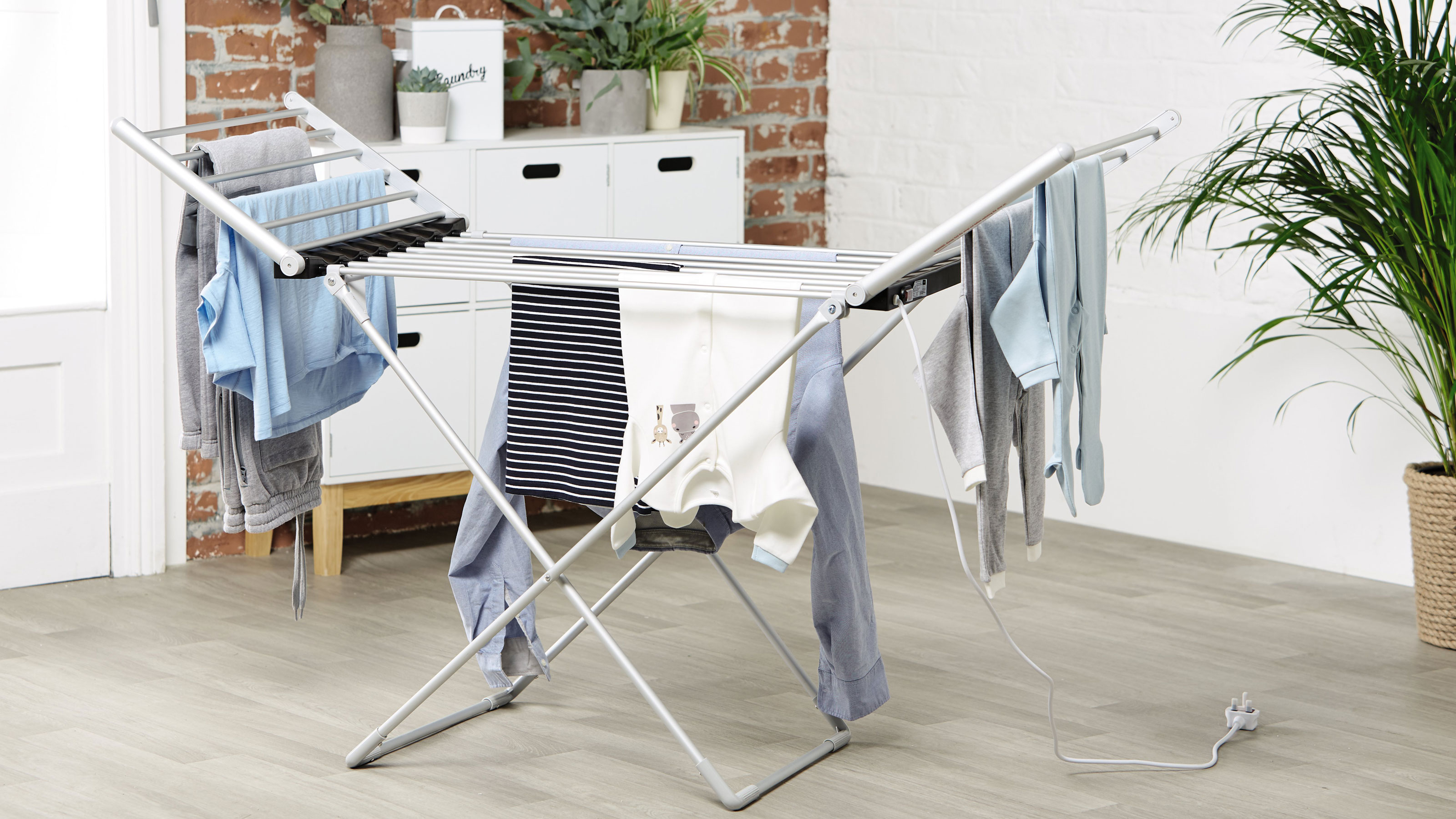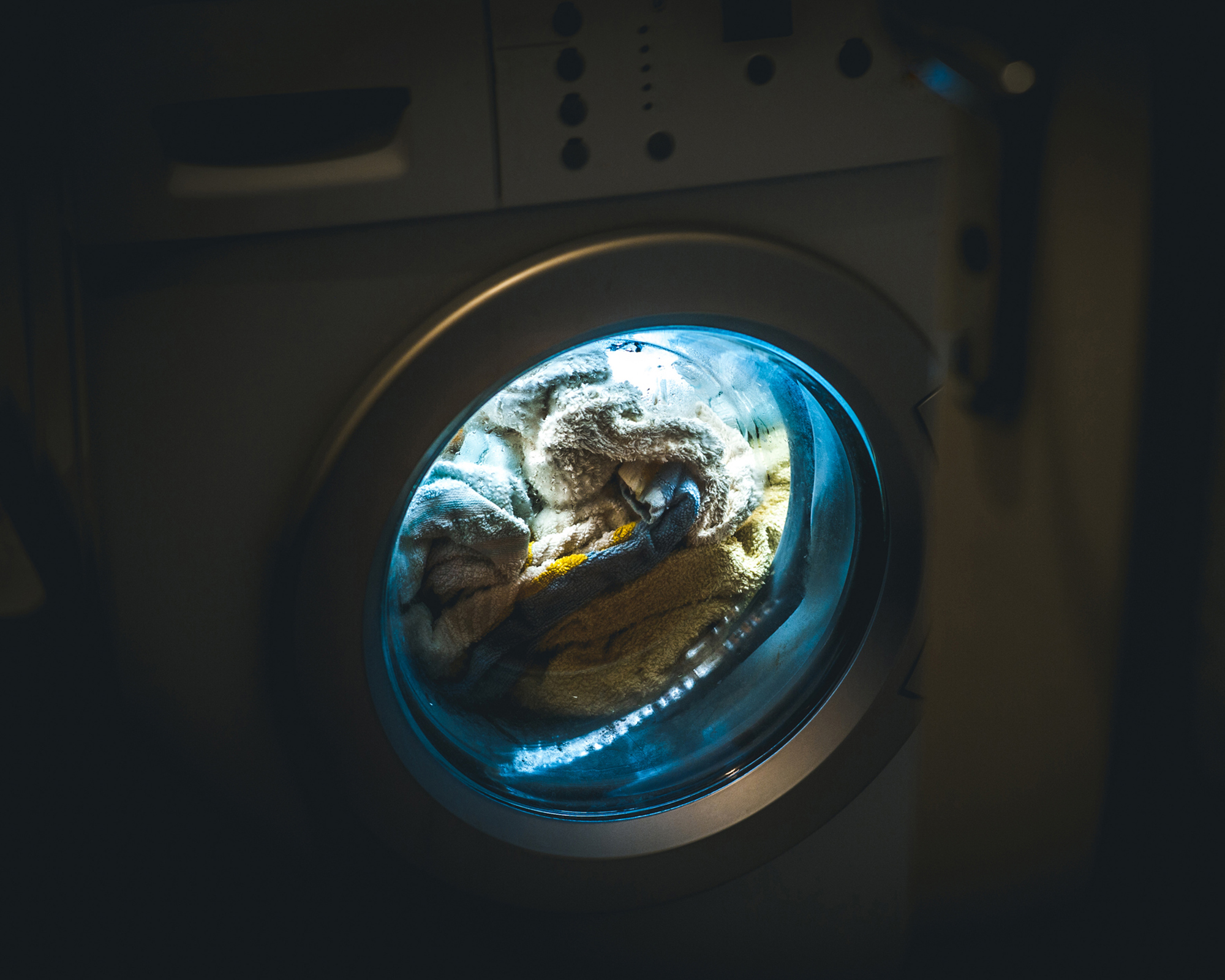Heated clothes airer or tumble dryer: which is the better appliance?
Get a (washing) load of this to save time and money


Wondering whether a heated clothes dryer or tumble dryer is cheaper to dry clothes? It's certainly crossed our minds too! Unless you've been living under a rock (or off-grid), you'll know that we're all trying to find ways to heat and eat cheaply, and generally reduce the cost of running our homes.
Whether you go to work, stay at home in your jammies, or exercise, having clean clothes is important in order to feel fresh and comfortable. Sweat, food, and mud stains are all normal, so if you're washing clothes to get rid of these marks, you'll need to find a way to dry your outfits quickly too.
Drying them on a clothesline is all good and well when the sun is shining, but if you're short on outdoor space or it's raining outside, you may need to rely on a heated drying rack, tumble dryer, or washer-dryer combo.
Of course, all of these rely on electricity, and with the rate of energy increasing, you'll want to know which is the most cost-effective appliance. Together with the experts, we'll look at the kwH (or kilowatts per hour) cost, plus the time it takes to dry your pants, skirts, and shirts with each method.
If you've got a tumble dryer, you certainly don't need to ditch it, but using a heated clothes dryer once in a while might be the better option for the environment, especially if you haven't got an important work meeting the next day or need to pack for a vacation.
Energy use: Heated clothes airer or tumble dryer?
Before we make the comparison between a heated clothes airer versus a tumble dryer, it's worth noting that not all dryers dry the same. Still with us? When investing in this appliance, there are three types of this machine, according to Naeem Adam, washing machine expert at AO.com.
- Condenser tumble dryers: These remove moisture from your clothes and store it in a removable tank. This kind of dryer is ideal if you can’t vent the moisture outside using a hose, but you’ll need to empty the tank after each cycle ends.
- Heat pump tumble dryers: Heat pump tumble dryers recycle hot air created inside the drum to dry clothes, which makes them really efficient. This saves a lot more energy, but programs may take a little longer to dry laundry, so bear this in mind when you’re shopping.
- Vented tumble dryers: Vented tumble dryers remove moisture from your clothes and feed it outside through a vent. They come with a long hose to help you do this, but you may need to get it installed by a professional if you want to vent the moisture out through a wall. While vented models tend to be the cheapest on the market, they’re also the least energy efficient.
Costs: Heated air fryer or tumble dryer?
According to the Energy Saving Trust, the average tumble dryer uses roughly 4.5 kWh per cycle (or 4500 watts). If you use yours for an hour at the current energy price cap, this works out to £1.53 per cycle. Stateside — you're looking at about 67 cents.
Capacity: Heated clothes airer or tumble dryer?
You might be thinking: "Which of these can dry a large load of washing quickest?" This depends on how large the drum of your tumble dryer is, the wattage, and the size (and design) of your electric airer. Generally speaking, your tumble/washer dryer will trump your clothes horse or drying rack, but it does come at an energy cost.
An average tumble dryer can hold a medium load of washing (around 7–10 kg), which is great to get your bed sheets, shirts, and sweats dried all at once. By correctly drying clothes on a heated clothes airer (with sleeves or legs stretched out over the heated tubes) in a warm room, you might find that you can dry your clothes more quickly this way.
Get small space home decor ideas, celeb inspiration, DIY tips and more, straight to your inbox!
It's also worth noting that for safety reasons, some tumble dryers have a cooling-down stage, and you may have to wait for this to end before you take your clothes out of the machine. Failure to do so might damage the appliance.
On the other hand, one advantage of owning an electric clothes dryer is that you can access faster-drying items immediately, so tops and socks can be taken off ASAP. If you already own one of the best dehumidifiers, having this running simultaneously can also create the ideal indoor environment for drying clothes. No worries if you don't have the budget to buy one. Just look out for an electric clothes airer with a hood to trap in the heat.
Drying delicates: Heated clothes airer or tumble dryer?
Delicate materials like Merino wool, cashmere, and silk often come at a premium price, so you wouldn't want to damage the fibers and make your clothes fray, or worse, rip at the seams.
Use the tumble dryer and you risk treating your textiles too harshly. Continually spinning your special items can be quite a harsh way to dry them, and embellishments could catch and damage the machine or your favorite vintage wares.
It's worth looking at the washing symbols on your clothing labels to assess whether or not they're suitable for the tumble dryer. If you're unsure, it's safer to use an electric clothes dryer as a static alternative to a tumble dryer. Or worst case, reserve space on your radiator to dry clothes without an airer.
Is it better to do laundry at night or in the morning?

This all depends on which energy tariff you are on. Generally speaking, if you live in the UK and have an Economy 7 (E7) meter, then try and use your appliances in off-peak hours. By using your washing machine, tumble dryer, or heated clothes airer at night, you can make significant savings.
However, it's also worth using a washing machine on a high cycle so your clothes are drier when you take them out.
Reuseable wool dryer balls (available from Amazon) are also a worthy investment. These help to circulate hot air around your clothes and cut down the drying time in a tumble dryer.

Hi, I'm the former acting head ecommerce editor at Real Homes. Prior to working for the Future plc family, I've worked on a number of consumer events including the Ideal Home Show, Grand Designs Live, and Good Homes Magazine. With a first class degree from Keele University, and a plethora of experience in digital marketing, editorial, and social media, I have an eye for what should be in your shopping basket and have gone through the internal customer advisor accreditation process.